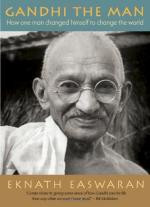
|
| Name: _________________________ | Period: ___________________ |
This test consists of 15 multiple choice questions and 5 short answer questions.
Multiple Choice Questions
1. Finding himself happier and healthier for the change, Gandhi shifted his attention to what?
(a) Studying religion.
(b) His diet.
(c) Looking for a new wife.
(d) Understanding British culture.
2. When a man does everything in worship, Easwaran explains, everywhere he goes is what?
(a) His world.
(b) His home.
(c) His family.
(d) A temple.
3. Perhaps one of his most potent moments on the world stage came when what happened?
(a) He was taunted for inciting sedition.
(b) His followers were arrested for inciting sedition.
(c) His followers left him to be arrested for inciting sedition.
(d) He was finally arrested for inciting sedition.
4. Gandhi's marriage to Kasturbai was arranged by whom?
(a) God.
(b) His parents.
(c) The religious leaders.
(d) Himself and Kasturbai.
5. Michael N. Nagler of the University of California, Berkley provides the forward for the book, and opens by asking the reader what?
(a) To consider whether Gandhi helped others.
(b) To consider whether Gandhi is a good example to follow.
(c) To consider whether Gandhi might be the most significant historical figure of the 20th century.
(d) To consider whether Gandhi was a great man.
6. Having made a dismal performance in high school, what did Gandhi need?
(a) A job.
(b) A new direction.
(c) A second chance at high school.
(d) New guidance.
7. Gandhi described himself as what?
(a) A cowardly child with a rather weak mind.
(b) An unusual child.
(c) A uniquely strong child.
(d) A typical child with many friends.
8. What did Gandhi's uncle suggest he do?
(a) Go to England to study law.
(b) Go to England to find work.
(c) Go to England to study medicine.
(d) Go to England to study religion.
9. Throughout these years of satyagraha in India, he continued to make friends and gain followers including who?
(a) The wealthy and privileged Jawaharlal Nehru.
(b) The British leaders.
(c) The poor.
(d) The leaders of many nations.
10. Gandhi determined that the whole British-Indian relationship could be transformed with such an approach of non-violence, or ____________.
(a) Baptisma.
(b) Ahimsa.
(c) Bahimsa.
(d) Allahisma.
11. Gandhi coined the word ____________ to describe the Dalits (the oppressed), to call them the children of God, in order to remind the higher classes that their actions toward the oppressed was a part of their worship of God.
(a) Maharijan.
(b) Madarijan.
(c) Harijan.
(d) Darijan.
12. How did Gandhi react to this British passenger?
(a) He refused to move.
(b) He laughed at him.
(c) He stood up in his seat.
(d) He did as he asked.
13. How successful was Gandhi in Bombay?
(a) He did not practice law in Bombay.
(b) Not very successful.
(c) Somewhat successful.
(d) Very successful.
14. Part of what made Gandhi so very winsome was what?
(a) His kind personality.
(b) The simplicity and poverty in which he continued to voluntarily live.
(c) His ability to give.
(d) The extravagant life he led.
15. His discovery inspired him to finding more and more means to do what?
(a) Serve.
(b) Take on court cases.
(c) Work on more difficult cases.
(d) Earn more money.
Short Answer Questions
1. Seeing that his client was clearly right, and a long court battle would benefit no one but the lawyers, what was Gandhi determined to do?
2. Easwaran opens his chapter describing the Way of Love by recounting what story?
3. Gandhi met with Lord Irwin to negotiate, and made a point of taking a tiny bag of salt from his cloak and told the viceroy that he would drink his tea with salt in remembrance of what?
4. Nagler points to Gandhi's very inauspicious beginnings as an underachieving student with ____________________.
5. Nagler cites all of the fields in which Gandhi inspired revolution, including economics, politics, philosophy and the science and art of _________.
|
This section contains 669 words (approx. 3 pages at 300 words per page) |

|




